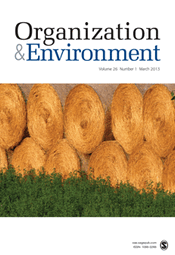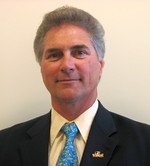Time to Reverse the Sustainability Crisis
Editor’s note: The new issue of Organization & Environment (OAE) is now available online! We are delighted to welcome Mark Starik of San Francisco State University and Patricia Kanashiro of George Washington University, who published the lead article, “Toward a Theory of Sustainability Management: Uncovering and Integrating the Nearly Obvious.” Click here to access the full issue free through March 15.
The inspiration for this article was the relentless, continuous, and distressing news about both environmental degradation and socio-economic deprivation that most of us receive on at lea st a day-to-day basis, which we think should prompt both sustainability academics and practitioners to do something differently in order to help reverse these sustainability crises. We proposed that, if organization/management theory has any relevance to practice (and, thereby, to results), and, if our current organization/management theories do not appear to be up to the task of assisting in this vital transformation toward sustainability, then new theories of sustainability management apparently need to be developed, considered, tested, and applied.
st a day-to-day basis, which we think should prompt both sustainability academics and practitioners to do something differently in order to help reverse these sustainability crises. We proposed that, if organization/management theory has any relevance to practice (and, thereby, to results), and, if our current organization/management theories do not appear to be up to the task of assisting in this vital transformation toward sustainability, then new theories of sustainability management apparently need to be developed, considered, tested, and applied.
 We think many sustainability researchers (both academic and non-academic) have “bent over backwards” trying to use traditional organization/management theories to help guide practice for more effective sustainable results, and some of these have been stellar in quality. But, they do not appear to be providing enough of a positive impact on practice and results to reverse our collective environmental and socio-economic looming catastrophes.
We think many sustainability researchers (both academic and non-academic) have “bent over backwards” trying to use traditional organization/management theories to help guide practice for more effective sustainable results, and some of these have been stellar in quality. But, they do not appear to be providing enough of a positive impact on practice and results to reverse our collective environmental and socio-economic looming catastrophes.
So, our proposed sustainability management theory, which we think is one of many such possibilities, suggests that the more frequently, broadly, deeply, genuinely, competently, and systematically that individuals, organizations, and societies are aware of, think about, and act on sustainability issues, the more likely it is that eventually the results of those actions will be more sustainable (which we describe as the capacity to advance long-term environmental and socio-economic quality of life) and will be so on a significant scale. We assert that what we collectively appear to need to move toward, including at the individual, organizational, and societal levels, is to immerse ourselves in the rationales for environmental and socio-economic sustainability and to identify how we can practice effective approaches as often and as widely as possible to make a significant positive sustainability impact.
Regarding the potential for our article to influence future directions in research and practice, our intent was and hope is that the article will generate multiple conversations about the need for sustainability management theories, what these theories might entail that is either similar to or different from ours, and, perhaps most importantly, how any sustainability management theories that are found to be effective can be applied as soon, as widely, and as often as possible. We welcome all researchers (both academic and practitioner) to develop and test their own theories of sustainability management and to collaborate with one another in evolving those theories and, from local to global levels, in making a substantial, positive sustainability difference.
Click here to read the article, “Toward a Theory of Sustainability Management: Uncovering and Integrating the Nearly Obvious,” in the new issue of Organization & Environment (OAE). All articles are available free through March 15.
 Mark Starik is a professor of management and sustainability and the director of the Center for Ethical and Sustainable Business in the College of Business at San Francisco State University. He researches and teaches in the areas of business environmental and energy management and policy; has consulted with various business, government, and nonprofit organizations; and is a coeditor of Organization & Environment. He holds a doctorate in strategic management from the University of Georgia.
Mark Starik is a professor of management and sustainability and the director of the Center for Ethical and Sustainable Business in the College of Business at San Francisco State University. He researches and teaches in the areas of business environmental and energy management and policy; has consulted with various business, government, and nonprofit organizations; and is a coeditor of Organization & Environment. He holds a doctorate in strategic management from the University of Georgia.
 Patricia Kanashiro is a doctoral candidate in the Department of Strategic Management and Public Policy in the School of Business of the George Washington University. Her research interests are in sustainability, corporate governance, and business strategies for the poor in developing countries.
Patricia Kanashiro is a doctoral candidate in the Department of Strategic Management and Public Policy in the School of Business of the George Washington University. Her research interests are in sustainability, corporate governance, and business strategies for the poor in developing countries.


































































































Glad to see sustainability becoming a more visible and respected value in business management circles. Thanks for the nice post.